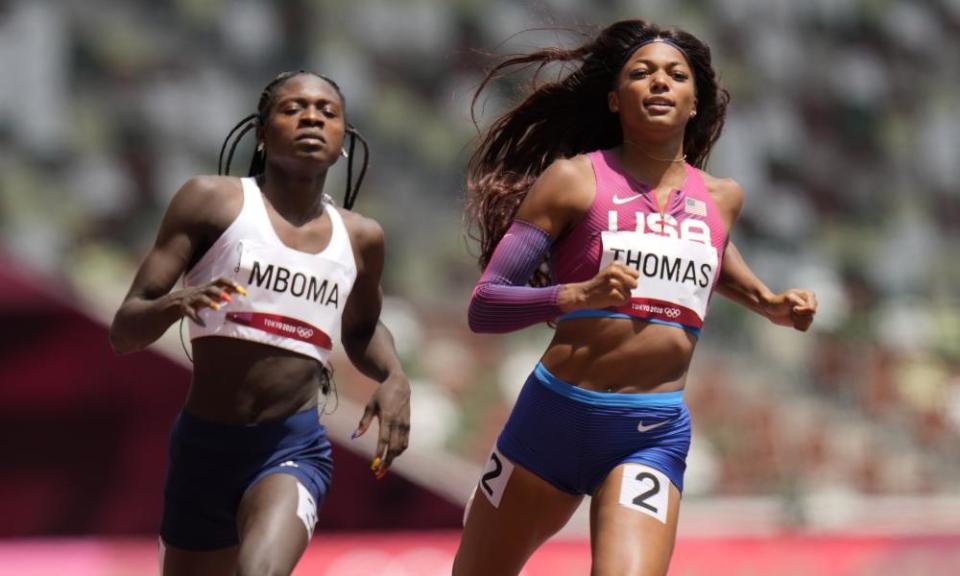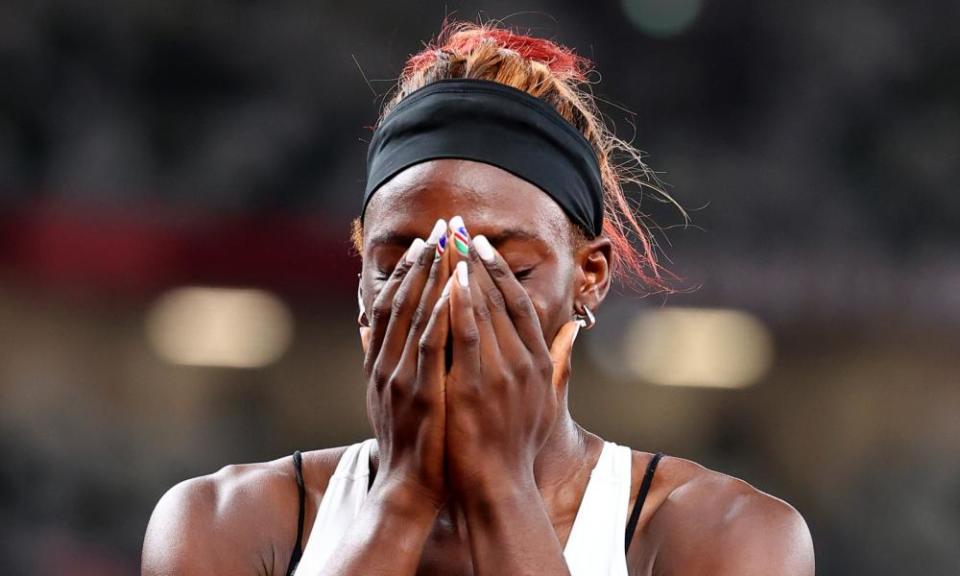Masilingi and Mboma racing against Olympic elite and complex cruelty

“I don’t understand why people come up with stuff like that. I just don’t get it. It’s very cruel.” Beatrice Masilingi is 18, born and raised in Katima in the Zambezi region of Namibia. In Tokyo’s Olympic Stadium she was as excited as you might expect of any teenager who has barely raced outside her home country, who lists “my grandmother” as her key influence, and who had minutes earlier come cantering in behind Shelly-Ann Fraser-Pryce to make the women’s 200m Olympic final.
Related: Britain’s Emily Campbell wins historic Olympics weightlifting silver medal
If Masilingi was also a little wary, it is because she knows some part of the future is likely to take a difficult turn if she performs with the same level of grace and fire in Tuesday’s final. Masilingi is one of a pair of Namibian teenagers, schoolmates at Grootfontein Agricultural College, who have a serious chance of a medal in the blue-chip sprint event of these Olympic Games.
At which point, that cruelty. In June Masilingi and Christine Mboma were barred by World Athletics from running in the 400m, their chosen event at these Games. In Tokyo they have already faced questions about whether they should be running at all, and indeed (again, aged 18) whether they should be classing themselves as women at all.
This stems from something with which both Masilingi and Christine Mboma were born. Naturally occurring raised testosterone levels mean both have been classified as DSD, or athletes with Differences of Sexual Development, and placed – to their surprise – in a strange, indeterminate category of sporting womanhood.
The 200m, for reasons of procedure, has yet to be closed off, but it may well be soon. Both are running that distance instead as late entrants (“I used to run it at school,” Masilingi shrugged shortly after making the Olympic final).
Mboma is a slighter, more soft-spoken figure. Two years ago she was a netball player, invited by a school coach to give the track a whirl. On Monday she did something sensational, and then for good measure did it again. To get the scale of Mboma’s performances in Tokyo on Monday it is necessary to contemplate first the hugely impressive figure of Gabby Thomas, the golden US 200m hope at these Games.
Thomas studied neurobiology and global health at Harvard. She set Ivy League records in the 100 and 200 metres. She had her first Reebok deal while she was still at college. Now 24, she ran the third fastest time ever at the US Trials in June. Her 21.61sec has been bettered only by Flo-Jo and gold here would confirm Thomas as an out-and-out superstar of US athletics. Well, she’s got to get past the teenager from Divundu first.
First up, at 10.54am Tokyo time, Mboma strode away from Thomas to clock the fastest time of the round. Eight and a half hours later she beat her again, this time with that glare of public scrutiny ramped up a little more.
Thomas was in lane six for the semi-final, an imposing figure in pink, already with her own champion’s aura. Mboma looked terribly nervous, but perked up to smile at the camera. She was slow out of the blocks, and lagging into the bend. At which point she just let it go (“I don’t give up, I keep pushing”), arms pumping a little wildly, but catching Thomas, who grimaced, losing that wonderful stride as she was passed. Ahead of them both Elaine Thompson-Herah won the race in a hugely impressive personal best, then took a moment to lie prone on the track. Mboma barely looked out of breath.

No one really knows how fast the girls from Grootfontein might run on Tuesday night, although it will have to be extremely fast indeed to crash that stellar podium. But then, win or lose, this is not the story that will be told.
Back to that cruelty. The situation for athletes placed in this category is both confusing and incendiary. World Athletics, tooled up with scientists and lawyers, has wrestled with this issue in public since the grim, horribly insensitive treatment of Caster Semenya at the same age. It is an issue that refuses to present an easy answer. It is the job of sport to adapt, to scrutinise this, to find a way. Categories must be maintained in some sense: they exist for a reason, to create fair competition.
But right now the power, the decision-making, the tide of regulation lies in a strange and indeed uncomfortable place. The issue here is the definition of womanhood, as decreed by a narrow band of sporting administrators. Mboma and Masilingi are women. The raised testosterone levels, often a result of internal sexual characteristics, is simply a part of who they are. This state is far from unheard of. It is not an attempt to cheat, or a cancellation of biological sex, or anything other than, in pure sporting terms, a naturally occurring advantage, albeit one that is deemed unwomanly to an unacceptable degree, unfairly undainty by Sebastian Coe, the head of World Athletics, and his teams of experts.
There are pressing questions here about the way this kind of issue has played out in the past: the toxic spectacle of administrators, unsympathetic media and – of course – men on the internet arguing so publicly and with such certainty over the bodies of these young women.
The root of the issue is testosterone, a key metric of both doping control and biological masculinity. The science is complex, and keenly fought, but some ideal state might lie in a way to distinguish between artificially raised levels and those that are natural. The pragmatic situation, proposed by World Athletics, is for women with those levels to take testosterone-suppressing drugs if they want to race at distances from 400m to 1500m. There is something troubling about asking a woman athlete to take a drug that alters your natural state, affects your mood, interrupts your talent, suppresses what your body does naturally. This solution feels like the wrong side of history. Time will not judge it kindly.
Related: Belarus athlete who refused to fly home is granted Polish visa
For now that 200m final promises a thrilling contest. The two Jamaican women will be favourites now to take silver and gold. Fraser-Pryce, such a serene, reassuring figure in the gloom of these peculiar Games, is almost twice the age of her Namibian rivals. Thompson-Herah can complete a Bolt-lite double-double with a fourth Olympic gold.
There was one telling moment in the mixed zone as Mboma stuttered a little in front of the gathered throng. Marie-Josee Ta Lou of the Ivory Coast, 32 years old at her second Games, and also in Tuesday’s final, came across and wrapped her arms around her teenage competitor, offering a fond, maternal hug, and excited congratulations. It felt like a significant gesture from a fellow athlete. It is to be hoped that the world will be similarly gentle with a pair of 18-year-olds who have had these complicators thrust upon them and still just want to talk about racing. “It’s crazy,” Masilingi said, looking forward. “Now I’m in the final I’m just really happy with myself.”

 Yahoo Finance
Yahoo Finance 